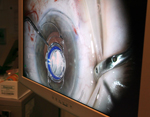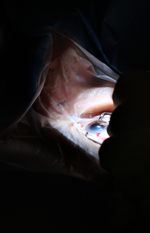|
Justine Wise,
86, tried to adjust for the dark
smudges that blurred her vision
that she has had to cope with for
more than 10 years. Having
end-stage age-related macular
degeneration, doctors told her
there was no further treatment.
Then her
daughter told her about the
implantable telescopic lens
procedure now available at MUSC's
Storm Eye Institute. Wise became
part of history July 13 when she
became the first patient in the
Southeast to receive a telescopic
lens implant. Charlene Grice,
M.D., removed a cataract in her
right eye and then inserted an
Implantable Miniature Telescope.
 Dr. Grice puts in the
Implantable Miniature Telescope in
86-year-old patient Justine Wise's
right eye after removing her
cataract. The telescope will help
Wise's eyesight that has been
deteriorating for more than 10
years because of age-related
macular degeneration. Dr. Grice puts in the
Implantable Miniature Telescope in
86-year-old patient Justine Wise's
right eye after removing her
cataract. The telescope will help
Wise's eyesight that has been
deteriorating for more than 10
years because of age-related
macular degeneration.
The miniature
telescope, which was implanted
immediately after removal of a
cataract, is smaller than a pea,
and sits behind the iris
projecting an enlarged image of
what patients see in their central
vision.
Age-related
macular degeneration involves the
loss of vision in the center of
the visual field because of damage
to the retina. It is the leading
cause of vision loss in patients
older than 55 years and affects
1.8 million patients in the United
States.
The trade-off
for gains in central vision in the
implanted eye is loss of
peripheral vision in that eye. To
compensate, only one eye is
implanted, with the second eye
providing peripheral vision.
Patients
wishing to undergo the procedure
must also agree to a
post-procedure vision
rehabilitation training program
that basically retrains the brain
how to see and enhances the
effectiveness of the implant.
Trained optometrists and
occupational therapists at the
Feldberg Vision Rehabilitation
Center at Storm Eye Institute or
at other similar facilities help
patients adjust to their new
vision.
 Justine Wise had her
surgery July 13. Justine Wise had her
surgery July 13.
Through
clinical trials, it has been
discovered that the telescopic
lens can increase the patient's
vision by at least two lines on an
eye chart. This offers patients
the ability to have a more normal
life and to return to some of the
activities they were not able to
do prior to the surgery, such as
recognizing faces, writing checks
and distinguishing colors.
"Although not a
cure, the telescopic lens helps
these patients live more
independently in the meantime,"
said Grice, assistant professor of
ophthalmology at MUSC Storm Eye
Institute.
Grice said
she's pleased that Wise, who
traveled from Ohio for the
procedure, was already seeing
improvements one week after her
surgery, even before starting her
occupational training. "She is
doing much better than we
anticipated because her vision is
already improving and her wound is
healing nicely. We are very
pleased at the progress she has
made," she said.
Wise attributes
her progress to her determination
to see better and her supportive
family. She looks forward to more
improvements as she goes through
therapy. "I am seeing some with
both eyes. I am very satisfied and
hopeful. You need family to
surround you and help you through
it because without them you can't
do it."
To see a video
of the surgery, visit http://tinyurl.com/d8reqj6.
|



 Dr. Grice puts in the
Implantable Miniature Telescope in
86-year-old patient Justine Wise's
right eye after removing her
cataract. The telescope will help
Wise's eyesight that has been
deteriorating for more than 10
years because of age-related
macular degeneration.
Dr. Grice puts in the
Implantable Miniature Telescope in
86-year-old patient Justine Wise's
right eye after removing her
cataract. The telescope will help
Wise's eyesight that has been
deteriorating for more than 10
years because of age-related
macular degeneration. Justine Wise had her
surgery July 13.
Justine Wise had her
surgery July 13.